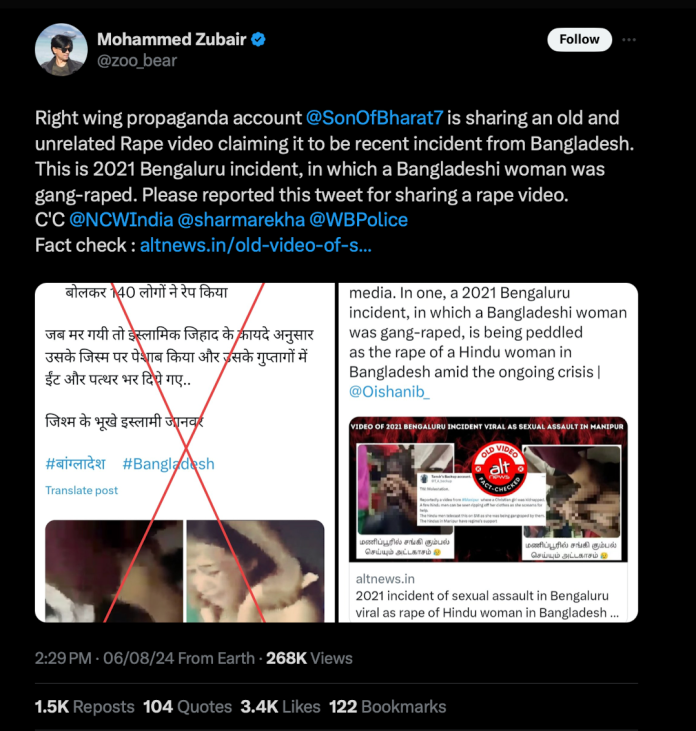MORE COVERAGE
Twitter Coverage
Satyaagrah
Written on
Satyaagrah
Written on
Satyaagrah
Written on
Satyaagrah
Written on
Satyaagrah
Written on
JOIN SATYAAGRAH SOCIAL MEDIA
"वो भूली दास्ताँँ लो फिर याद": Mohammad Zubair's efforts to whitewash crimes against Hindus in Bangladesh reveal the extent of barbarity by illegal Bangladeshis in India, highlighting the urgent threat posed by extremist ideologies to the nation's society

As the political landscape in Bangladesh was thrown into chaos with the abrupt resignation and subsequent fleeing of former Prime Minister Sheikh Hasina, the country became a breeding ground for violence orchestrated by Islamist mobs. These mobs, fueled by what they proclaimed as a 'revolution,' went on a rampage, targeting minorities, especially the Hindus, with a ferocity that drew global attention. The unrest was marked by scenes of pillaging, plundering, and outright attacks on religious minorities, with disturbing images and videos quickly spreading across various social media platforms.
During this tumultuous period, an unsettling trend emerged in India, spearheaded by Mohammed Zubair and the platform he co-founded, Alt News. Known for its far-left leaning and a reputation for selectively fact-checking content that tends to favor Islamist narratives, Alt News shifted into overdrive. Zubair, in particular, became the focal point of this effort, choosing to publish and disseminate 'fact-checks' that many criticized as trivializing the severity of the situation in Bangladesh. His approach seemed to downplay the dire circumstances faced by religious minorities, giving an impression that the reported violence was being exaggerated by those with vested interests within India.
 |
| Source: X |
On August 6, 2024, Alt News published a particularly controversial 'fact-check' regarding a horrifying incident caught on video. The footage depicted a woman being brutally gang-raped by a group of Bangladeshi men—a stark representation of the escalating violence in Bangladesh. Despite the clear implications of the video, Zubair and his team focused on minor discrepancies in the footage's narrative context, seemingly undermining the gravity of the crime and its implications for Hindu minorities. This approach by Zubair has not only raised eyebrows but also sparked intense criticism regarding his and Alt News's intentions and the impact of their actions on the broader perception of the violence against Hindus in Bangladesh.
While the video vividly illustrated Bangladeshi men utilizing rape as a weapon against women—a barbaric tactic historically linked to Islamic marauders known for treating women and children as spoils of war, subjecting them to severe violations and forcefully incorporating them into their harems—Mohammad Zubair shifted focus from the heinous acts depicted to the video's origins, disregarding the profound emotional impact and historical context conveyed by the content.
In his interactions on social media, Zubair dismissed the video as outdated and irrelevant, claiming it was related to an incident from 2021 in Bengaluru, where a Bangladeshi woman was the victim of gang rape. Furthering this narrative, he provided a link to an Alt News ‘fact-check’ article to substantiate his assertions.
The ‘fact-check’ by Alt News asserted that the controversial video was not from Bangladesh and dated back to 2021, contradicting initial perceptions of its relevance to ongoing events. The article referenced a report from News Bangla 24, which clarified that the actual event occurred in Kerala, and both the victims and the perpetrators were of Bangladeshi origin. It detailed that the incident involved illegal Bangladeshi migrants, as per police reports. The Bangalore police had apprehended 12 individuals, including three women, under charges of trafficking a young Bangladeshi woman to India under false pretenses of employment, only to force her into prostitution subsequently.
The incident has highlighted the persistent issue of illegal immigration that plagues India. The unceasing influx of illegal immigrants from Bangladesh remains a significant challenge, with many entering the country, often obtaining counterfeit identity documents, and participating in unlawful activities. There is a notable history of these illegal immigrants being implicated in human trafficking networks, the illicit drug trade, and a variety of criminal behaviors, including theft and assault.
| Actual video is avialble here - Join | t.me/SatyaagrahIndia |
Despite concerted efforts by the Indian government to curtail this problem, the steady stream of illegal immigrants crossing from Bangladesh into India shows no signs of abating. Recent reports from the past ten days alone detail multiple instances across different regions of India where Bangladeshi nationals have been caught entering the country illegally. These individuals were swiftly identified and apprehended by Indian authorities, reflecting ongoing vigilance against such violations.
A notable case was reported on 31st March of this year when the Maharashtra Anti-Terrorism Squad (ATS) apprehended five Bangladeshi nationals in Navi Mumbai for illegal entry and residence in India without proper documentation. The individuals arrested were Aahat Jamal Sheikh, aged 22; Rebul Samad Sheikh, aged 40; Ronney Soriful Khan, aged 25; Julu Billal Sharif, aged 28; and Mohammad Munir Mohammad Siraj Mulla, aged 49.
An ATS official reported receiving a crucial tip-off that led to a targeted operation by the Vikhroli unit in Ghansoli, Navi Mumbai. The operation focused on two specific sites: Janai Compound and the Shivaji Talao area. During this meticulous operation, five Bangladeshi nationals were detained, none of whom possessed legitimate documents or permits to reside in India. These individuals had been working as masons in Navi Mumbai, which highlights not only the scope of illegal immigration but also the infiltration of such individuals into the local workforce.
|
Following their detention, these immigrants were arrested under the stringent provisions of the Foreigners Act of 1946 and the Passport (Entry into India) Rules of 1950. This legal action underscores the Indian government's resolve to enforce its immigration laws and secure its borders against unauthorized entry.
Simultaneously, on the same day, March 31st, further south in Assam, the Mankachar police made another significant arrest. An illegal Bangladeshi national, Osama Bin Hasan Sajib, who had been residing in the region for eight months, was apprehended. Sajib, the son of Manzoorul Hasan from Veluya village in the Sherpur district of Bangladesh, was discovered hiding at Khalilur Miah’s home in Jhanjhani village, Mankachar. His entry into India was traced back to crossing the border from Mahendraganj in Meghalaya approximately eight months prior.
During his time in India, Sajib engaged in 'faith healing' practices across Mankachar and other parts of Meghalaya. The presence and activities of Sajib and similar cases of illegal immigrants highlight the ongoing challenges faced by the Home Ministry. These incidents emphasize the complexities of managing internal security and the continuous threat posed by illegal immigration, which not only jeopardizes legal frameworks but also poses significant social and security risks. Reports from various parts of the country confirm that illegal Bangladeshi immigrants often become involved in activities that lead to disturbances and challenges in law and order, exacerbating the issues confronting the Home Ministry in its efforts to safeguard the nation's internal safety.
|
How Illegal Bangladeshi Immigrants Have Been Indulging in Criminal Activities in India
The incident highlighted by the 'fact-check' from Alt News was intended to question the validity of the reports concerning the violent attacks on Hindu minorities in Bangladesh amidst its political chaos. However, this investigation by Mohammad Zubair and Alt News inadvertently revealed the harsh realities of the crimes committed by illegal Bangladeshi immigrants in India, showing that their disregard for law and order transcends borders. In a Hindu-majority India, just as in Bangladesh, these individuals displayed brazen acts of violence, with the circulated video shockingly showcasing the brutal assault of a woman by these illegal immigrants.
Moreover, this 'fact-check' unexpectedly serves as a stark warning about the potential future challenges India might face if stringent measures are not taken against the illegal immigrant population, including the Rohingyas harbored within its borders. Without decisive action to deport these groups back to their countries, the threat they pose could escalate. The majority of these immigrants are described as being steeped in extreme ideologies, with inclinations towards Islamic supremacism and motivations for jihad, which could lead to further destabilization of the region, as both historical evidence and current events in Bangladesh suggest.
In attempting to counter claims of Islamist violence against Hindu minorities in Bangladesh, Mohammed Zubair has also been linked to broader controversies. His actions have been controversial, particularly his rhetoric against former BJP spokesperson Nupur Sharma, which incited a severe diplomatic fallout for India and sparked the 'Sar Tan Se Juda' protests. These protests tragically resulted in the deaths of several individuals, including Kanhaiya Lal of Udaipur and Umesh Kolhe of Amravati. Zubair’s approach to portraying these incidents in Bangladesh as mere 'right-wing propaganda' has been heavily criticized for apparently trying to downplay the severity and implications of these attacks on Hindu minorities.
|
However, truth eventually caught up with him, as Bangladeshi Hindus came forth and shared their ordeal with the world. The videos and pictures of Islamists going on rampage against Hindus in Bangladesh, defiling their temples and desecrating their idols, violating their women, and killing their men debunked his propaganda that Bangladeshi Hindus were safe and not subjected to religious persecution. These powerful images and firsthand accounts provided a stark contradiction to the narratives that sought to minimize the severity of their circumstances.
Amidst the unrest in the neighbouring country, Islamists saw an opportunity to kill and torture the minority Hindus in the country and loot their properties. This chaotic situation not only facilitated widespread violence but also encouraged targeted attacks on Hindu communities, exacerbating the already dire human rights situation in the region. One of the most devastating stories coming from Bangladesh is of famous Bangladeshi singer Rahul Ananda whose house was looted and burnt down by an Islamist mob. The attack not only resulted in significant loss of property but also in the displacement of his family, which highlights the personal and communal impact of the ongoing violence.
On the afternoon of 5th August, an Islamist mob reached the house of the singer and frontman of the band Joler Gaan, Rahul Ananda. He was living in a rental house that was attacked. When the attack happened, Rahul, his wife Shukla, his son Tota, and other family members were there. Somehow, they managed to escape and took shelter at an unknown location. Their harrowing escape from a violent mob bent on destruction underscores the perilous situation faced by many Hindus in Bangladesh today, forcing them to flee their homes and seek safety in anonymity, away from the violence that has engulfed their lives.
|
Speaking to The Daily Star, a family source described the harrowing scene: “As soon as they had broken the gate, they started ravaging the house taking whatever they could find for themselves. They took everything from furniture and mirrors to valuables. After that, they torched the whole house and Rahul da’s musical instruments.” This act of violence not only resulted in the loss of personal and valuable property but also marked a deep cultural loss. There were around 3,000 irreplaceable musical instruments at the house which he designed and made over the years. The sheer number of instruments highlights not only their personal significance but also their cultural importance, reflecting years of dedication and artistic expression.
The monetary value of the household items lost could be close to Tk 10 lakh, but as Jarnal poignantly noted, “But how could you put a price on the instruments which he so lovingly built?” This statement underscores the profound personal and emotional impact of the destruction, which far surpasses the financial loss. These instruments were not merely objects but were extensions of Rahul Ananda's passion and heritage, painstakingly crafted over many years.
The incident involving Rahul Ananda, a renowned singer who has brought pride to Bangladesh, starkly illustrates the severe and indiscriminate nature of the attacks by Islamists. If such a prominent figure, who has contributed significantly to the cultural fabric of the nation, was not spared, it casts a grim reflection on the vulnerability of ordinary Hindus in Bangladesh. These individuals, who do not have the visibility or the resources that someone like Ananda might possess, are even more susceptible to such brutal acts of violence. Their plight is often exacerbated by their limited means to recover or protect themselves, leaving them particularly defenseless against such targeted aggression solely based on their religious identity. This ongoing situation reflects a dire need for greater protection and intervention to safeguard these communities and preserve the diverse cultural heritage of the nation.
 Support Us
Support Us
Satyagraha was born from the heart of our land, with an undying aim to unveil the true essence of Bharat. It seeks to illuminate the hidden tales of our valiant freedom fighters and the rich chronicles that haven't yet sung their complete melody in the mainstream.
While platforms like NDTV and 'The Wire' effortlessly garner funds under the banner of safeguarding democracy, we at Satyagraha walk a different path. Our strength and resonance come from you. In this journey to weave a stronger Bharat, every little contribution amplifies our voice. Let's come together, contribute as you can, and champion the true spirit of our nation.
 |  |  |
| ICICI Bank of Satyaagrah | Razorpay Bank of Satyaagrah | PayPal Bank of Satyaagrah - For International Payments |
If all above doesn't work, then try the LINK below:
Please share the article on other platforms
DISCLAIMER: The author is solely responsible for the views expressed in this article. The author carries the responsibility for citing and/or licensing of images utilized within the text. The website also frequently uses non-commercial images for representational purposes only in line with the article. We are not responsible for the authenticity of such images. If some images have a copyright issue, we request the person/entity to contact us at This email address is being protected from spambots. You need JavaScript enabled to view it. and we will take the necessary actions to resolve the issue.
Related Articles
- Muslim-owned restaurant's Hotel Manager Manzoor Ahmed despite clear instructions served beef to Hindu customers Supan Pal and his 12 friends celebrating a birthday party, arrested: Bangladesh
- Bangladesh and India put the final nail in the coffin of China’s ‘String of Pearls’ with access to Chittagong port as it was offered by PM Sheikh Hasina for use by India for trade and uninterrupted commerce
- Despite immense sacrifice by Hindu community in the liberation war they are subjugated denominations in the country. Bangladesh seized 26 lakh acres of land from Hindus under black law of “Enemy Property Act”
- Matarbari port in Bangladesh promises to be a strategic pivot for India, unlocking northeastern connectivity and boosting trade, as Japan aids this venture, India stands to gain not just in regional trade but also in countering China's growing footprint
- "तेरा यहाँ कोई नहीं": Bangladesh following Pakistan's dangerous path sentenced a Hindu girl Tithy Sarkar to 5 years in prison for alleged blasphemy, igniting outrage & raising serious concerns about escalating religious intolerance against Hindu minority
- By 2041, Bangladesh’s waste will hit 142,322 tons daily, outpacing landfills as pollution worsens, while delays stall WTE projects; urgent Public-Private Partnerships must convert waste into electricity to ease pollution and energy shortages
- "हाहाकार": Amid ongoing persecution, Hindu youth Sudeb Halder hacked to death, activists say he was murdered for being Hindu; 205 temple attacked, idols vandalized, ISKCON suppressed, blasphemy charges target Hindus under Yunus's interim rule
- "'Scar Tissue' is the only book I've ever written when I've felt completely toxic, ill": Hindu girl Priyanka Biswas stabbed by Mohammad Obaid Sikder for refusing his marriage proposal, stabbed her in back several times, complaint filed, accused absconding
- “We are preaching hope, standing on the piles of bones of the past”: Fall in Bangladesh’s Hindu population confirms their genocide, total population of the country has more than doubled over 50 years, but that of Hindus has dropped by around 7.5 million
- "Hindu Minorities Under Siege": Amidst escalating tensions in Bangladesh, EAM S Jaishankar assured Sheikh Hasina of India's full support and emphasized the importance of protecting minorities, as Hasina sought refuge in India following her resignation
- "बिजली गिराने मैं हूँ आयी": Adani Power will completely stop electricity supply to Bangladesh if $846M in dues aren’t paid by November 7; earlier, 50% of the supply was cut, worsening Bangladesh’s energy crisis amid ongoing fuel and dollar shortages
- Sheikh Hasina's oligarch sees regime change in Bangladesh as an 'Islamist-military coup,' while Bangladesh under Yunus faces delayed elections, rising Islamist influence, fears of a Caliphate, military sanctions & political turmoil fueled by global powers
- "तबे एकला चलो रे": Bangladeshi artist Rahul Ananda's 140-year-old cultural hub in Dhaka's Dhanmondi burnt by an Islamist mob, inciting a poignant response through music that calls for peace, as the artist and his family face devastation but remain hopeful
- "श्रापित देश": In Khulna, Bangladesh, Hindu boy Utsab Mandal killed by a Muslim mob over blasphemy accusations, with army and police present, confirmed dead by a mosque mic asking the mob to go home, local media deleted reports after video went viral
- "Whispers of death": In October 1990, 26 months before Karseva, Bangladeshi media spread a rumor that the disputed Babri structure had been demolished in India. The aftermath? 3,500 temples razed, and 2,400 Hindu women brutally raped


























